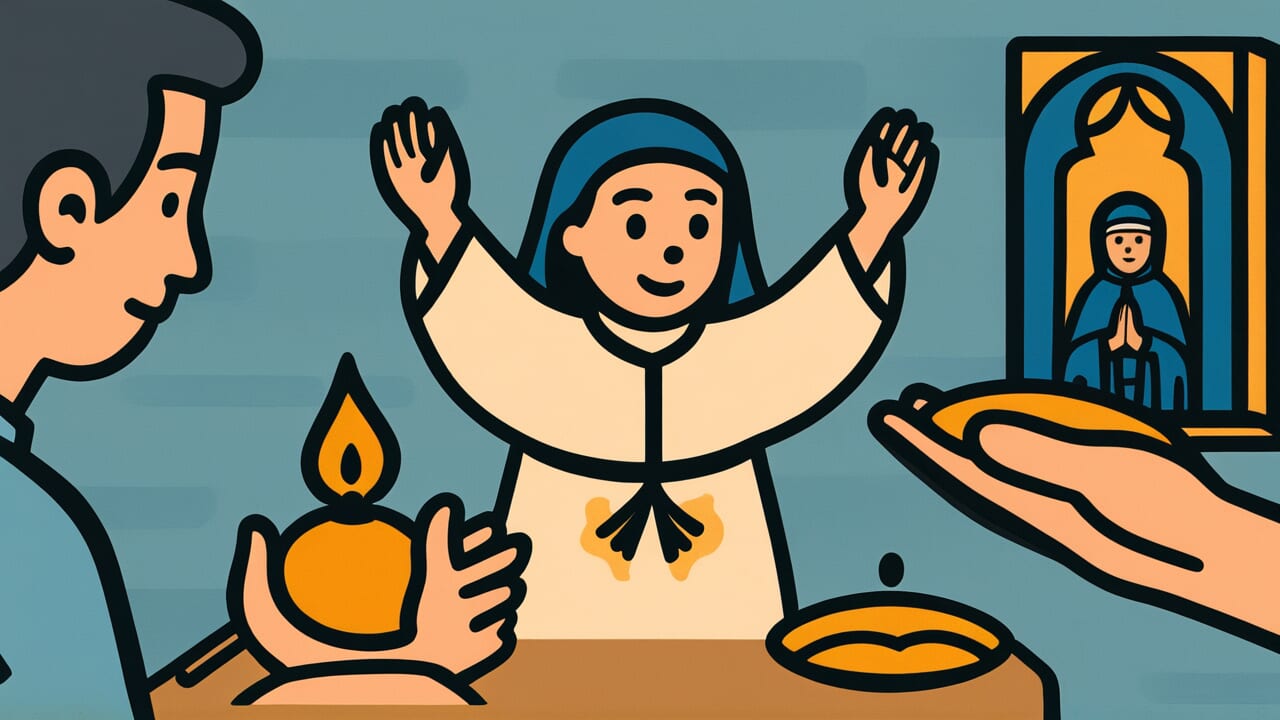How to Read “Charity over memorial services”
Kuyō yori segyo
Meaning of “Charity over memorial services”
“Charity over memorial services” means that helping living people is more important than mourning the dead.
This proverb teaches us that reaching out to people who are struggling right now is more valuable than spending time and money on memorial services for the deceased.
Feelings of remembrance for those who have passed are important. But if we focus too much on formalities and rituals, we might overlook real problems right in front of us. This proverb warns against such misplaced priorities.
Even today, people use this saying when questioning the high costs of funerals and memorial ceremonies.
It also applies when someone is so attached to past events or lost things that they can’t take necessary action in the present.
This proverb reminds us to ask ourselves: “What can I do for the people who are here right now?” It teaches the importance of keeping a practical perspective.
Origin and Etymology
No clear written records explain the origin of this proverb. However, we can learn interesting things by looking at the words themselves.
“Kuyō” (memorial service) is a Buddhist term. It means praying for the peace of the deceased through sutra readings and offerings.
“Segyo” (charity) means giving material goods or assistance to living people. By contrasting these two words, this proverb likely emerged from Buddhist values.
Buddhism emphasizes practicing compassion. But where should we direct that compassion? This question has been debated since ancient times.
Memorial services for the dead are certainly important acts. But spending too much money and time on them while ignoring living people in need creates a backwards situation.
This proverb was likely born as a teaching to warn against such misplaced priorities.
Japan has long had customs of spending large amounts on funerals and memorial ceremonies.
But in poor times, many families exhausted their finances on such rituals and fell into hardship. Witnessing this reality, ancestors left us these words to question what true compassion really means.
Usage Examples
- I’ll keep my father’s funeral simple and donate that money to disaster victims instead. Charity over memorial services, right?
- Rather than building an impressive memorial monument, we should use the budget to support the bereaved families. There’s a saying: charity over memorial services
Universal Wisdom
“Charity over memorial services” reflects a fundamental human conflict. It’s the eternal theme of balancing feelings about the past with responsibilities in the present.
We humans have a strong desire to give form to our feelings for lost things and deceased loved ones.
This is an expression of love and should never be denied. But sometimes these feelings become so strong that they blind us to people who need help right now.
This proverb has been passed down through generations because humans have always been easily captivated by “visible things.”
Impressive gravestones and lavish funerals are visible to the eye. But the suffering of people quietly struggling in the shadows is hard to see.
People tend to value what they can see and neglect what they cannot. Our ancestors understood this human weakness.
What is true compassion? What really matters? This proverb quietly yet powerfully asks us to choose substance over formality, present action over attachment to the past.
It continues to challenge us to have the courage to make that choice.
When AI Hears This
The human brain drastically reduces the value of rewards as time increases. This is called “hyperbolic discounting.”
For example, compare 10,000 yen today with 10,000 yen one year from now. Even though it’s the same amount, the brain feels today’s 10,000 yen is worth more than twice as much.
What makes this proverb interesting is how it compares two choices: memorial services after death versus charity during life.
In behavioral economics experiments, humans discount rewards one year away by about 30 percent. But rewards ten years away get discounted by over 70 percent.
Memorial services “in the infinitely distant future” after death become nearly zero value in the brain’s reward system.
Even more interesting is that memorial services are “uncertain acts that someone might do for you.”
In behavioral economics, uncertainty makes humans discount value even further. If the probability is 50 percent, the perceived value drops to less than half.
So memorial services receive a double discount from both “distant future” and “uncertainty.”
In contrast, charity during life is “a benefit received here and now with certainty.” The brain’s reward system responds immediately and perceives maximum value.
This proverb accurately captures the structural characteristics of human cognitive systems.
Lessons for Today
This proverb teaches modern people “the courage to face problems right in front of us now.”
We face various choices every day. Cherishing memories of the past and preserving traditions and formalities certainly have value.
But are we so captivated by these things that we overlook people who need help right now or issues we should address today?
In modern society, we can easily look at old photos on social media or lose ourselves in memories.
But while you’re doing that, someone around you might be struggling. Family, friends, coworkers, or even strangers might need your words or small actions.
This proverb doesn’t deny the past. It simply encourages us to use our limited life time and energy in more meaningful places.
What small kindness can you do today? That one step has the power to make someone’s life, and society itself, just a little bit better.



Comments